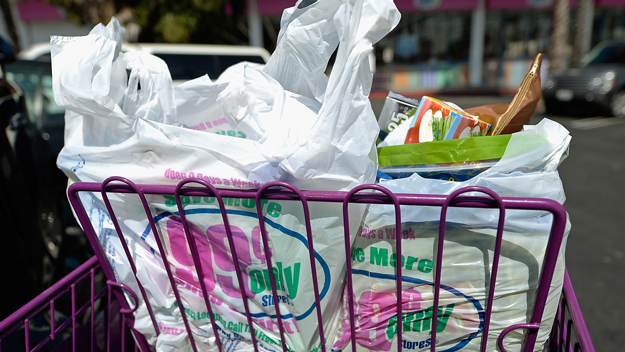

#1 – Create a Shopping List
Creating a shopping list can shorten the time spent buying groceries. No longer will last-minute meal decisions need to be made as you wander up and down the aisles, because you’ll know exactly what you need to buy before you even enter the store. Having a grocery list also prevents the type of aimless shopping which can lead to filling your cart with unnecessary food, just because you were unsure of what to buy. Impulsive purchases are what send grocery bills through the roof.
For those wondering how to create a detailed list of groceries, start with a comprehensive meal plan. Decide how long the groceries should last and plan out in detail each meal during that time frame. Once you know which meals you will be preparing, you’ll know exactly what foods should be added to the list. Be sure to add specific quantities where required, so you don’t end up buying the wrong amount of food as you are shopping.
#2 – Search for Flyers and Coupons
Before throwing your junk mail into the recycle bin, set aside the grocery store flyers. If you are one of the lucky few who don’t receive junk mail, rest assured, most flyers can be found on the Internet. Though grocery stores often post their latest flyer on their website, there are other websites that link to several of the latest flyers that can save you the trouble of searching for each one separately. A quick search for “online flyers” should point you in the right direction.
By reading the flyers, you’ll know which sales you’ll benefit most from. You should visit the stores advertising several of the items you plan to buy. It isn’t worth saving a few pennies on salad, if it requires extra time and gas to run across town to buy just the one item.
Though coupons are no longer required for most sale items, it can still be beneficial to do a quick search. You will find that many coupons provide excellent savings. Don’t be tempted to use them all however, as it doesn’t save anyone money to buy unnecessary things.
#3 – Never Shop Hungry
Though it might sound strange, a common mistake for grocery buyers is shopping with an empty stomach. People often buy unnecessary things when they are hungry, so it’s best to leave the shopping for later if you haven’t eaten.
Shortly after a meal is one of best times to shop for groceries. Before leaving however, you should give your stomach some time to settle. This is often the perfect time to check your local flyers and search for coupons.
#4 – Buy “In Season” Produce
For nutritious foods that don’t break the bank, the produce section is the best place to look. In fact, some of the cheapest foods for sale are fruits and vegetables. This becomes especially true for any produce that is currently in season. Better yet, seasonal foods will also reach their peak freshness during this time.
With worldwide food delivery, most kinds of produce are available year round. Certain foods however, will be at their peak during different seasons. These include:
Spring: apricots, carrots, pineapple, snow peas, spinach, and strawberries.
Summer: beans, blueberries, broccoli, corn, cucumber, peaches, peppers, raspberries, and tomatoes.
Fall: apples, cauliflower, grapes, mushrooms, pears, squash, and sweet potatoes.
Winter: citrus fruits, leeks, radishes, and turnips.
#5 – Avoid Ready-Made Foods
Pre-prepared foods may offer convenience, but are more expensive to buy and are often anything but nutritious. This is because they tend to be filled with ingredients like sugar, salt, and fat – all things a healthy diet should not include. Instead, cooking from scratch can save you money and allow for meals that contain more of the vitamins and minerals your body needs. It also allows you to substitute for ingredients you like, while leaving out the foods you’d rather not eat.
#6 – Sample Different Brands
It’s a myth that only leading brand manufacturers sell the best food. In fact, many of the products sold under the store brand label are made and packaged by the same factories that produce the popular name brands that you have come to know and love. Some store brand foods even taste better than the leading brand, but cost much less.
If you find a product that doesn’t meet your standards, simply try another brand until you do. There’s no harm in testing different brands, just avoid bulk purchases until you know if the product is right for you. If later on you still prefer the leading brand, you can always switch back.
By following some simple advice and changing a few of your shopping habits, it’s easy to avoid the common mistakes shoppers make when buying groceries. In doing so, you will save time and money, while benefiting from eating healthier foods at home. There has never been a better time to start shopping more efficiently, so what are you waiting for? Start buying your groceries like a professional!


































